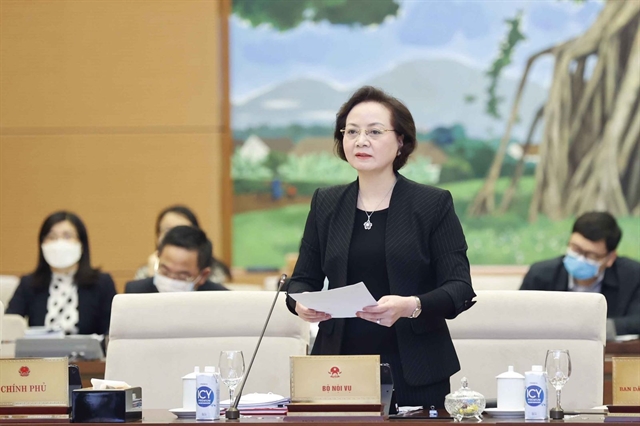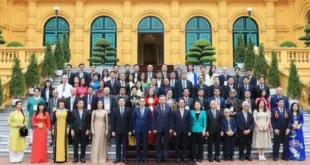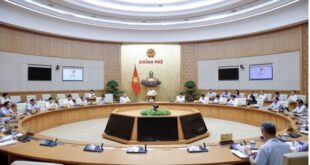
HÀ NỘI — The National Assembly Standing Committee on Wednesday morning discussed the draft law on the implementation of democracy at the grassroots levels.
Speaking at the discussion, Minister of Home Affairs Phạm Thị Thanh Trà said the law was expected to perfect the legal framework on implementing democracy at the grassroots level, ensuring that state power belongs to the people and affirming the nature of a socialist rule-of-law state – of the people, by the people, for the people.
“The law is also expected to promote publicity and transparency in operations and accountability of grassroots authorities, agencies, units and businesses,” she said.
On the basis of inheriting the relevant provisions of Ordinance No 34/2007/PL-UBTVQH11, Decree No 04/2015/ND-CP and Decree No 145/2020/ND-CP, the draft law has new contents.
The draft for the first time mentions the principle that all citizens are equal, without discrimination in the implementation of democracy at the grassroots level. The rights and obligations of citizens, cadres, civil servants, public employees and employees in the implementation of grassroots democracy are specialised. The provision on the authorisation of grassroots democracy implementation is added.
Under the draft, people have the right to complain, initiate lawsuits and denounce violations relating to the implementation of democracy at the grassroots levels. People have the obligation to promptly report, propose and report to competent authorities when detecting violations on its implementation.
On implementing democracy in communes, wards and townships, the scope of information disclosure at the commune level is proposed to be expanded to go in line with the provisions of the Law on Access to Information and current laws.
Forms of information disclosure at the commune level are proposed to be diversified, for example, posting information on portals and websites, through conferences, exchanges and dialogues between the People’s Committees of communes and the people; through citizen receptions, press conferences, press releases, activities of the spokesperson of the commune-level People’s Committee in accordance with the law.
It is also proposed that people discuss and decide directly more issues at the commune level. The draft also has regulations on initiatives proposed by the people, regulations on the forms of documents of the residential community, the amendment, supplement, replacement and annulment of resolutions of the residential community.
The authority that is empowered to recognise village conventions will be the commune People’s Committee instead of the district People’s Committee.
The draft includes new regulations on the responsibility to collect opinions of the people, opinions of the affected subjects when commune-level People’s Committees promulgate administrative decisions related to the interests of the community or administrative decisions which establish obligations, terminate or limit the rights and interests of the enforcer.
Regarding the implementation of democracy within agencies and units, there is no regulation on issues relating to individuals and agencies and organisations because the laws on specific areas and laws on organisation of the state apparatus as well as working rules of agencies and units have mentioned it already.
Additional forms of information disclosure are announcements through the internal information system or posting on portals and information pages of agencies or units.
The form of inspection and supervision through the activities of taking votes of confidence, voting of confidence for leadership and management positions in agencies and units according to regulations of competent agencies are added in this draft too.
The draft includes measures to ensure the implementation of democracy at the grassroots level. Specifying the responsibilities of the People’s Council, the People’s Committee of communes, heads of agencies, units and employers in implementing democracy at the grassroots level.
The results of the implementation of democracy at agencies and units will be used as the basis for assessing and classifying the quality of cadres, civil servants and public employees, commending and disciplining, assessing and classifying the quality of Party members for the head of the agency or unit.
Responsibilities of the Government, the Ministry of Home Affairs, the Ministry of Labour, War Invalids and Social Affairs are specialised in the draft. The agencies are also required to report the implementation of democracy at the grassroots level. Regulations on the responsibilities of the People’s Committees of provinces and districts in implementing measures to ensure the implementation of democracy at the grassroots level are legalised too.
Regarding the People’s Inspectorate, the Government proposes to add the People’s Inspectorate (currently adjusted in the Law on Inspection) to the provisions of the draft Law on Implementation of Democracy at the grassroots level. The draft law stipulates an overview of the functions and tasks of the People’s Inspection Committee and assigns the Government to coordinate with the Central Committee of the Vietnam Fatherland Front in detailing the organisation and operation of this agency.
Nguyễn Phú Cường, Chairman of the NA’s Finance and Budget Committee, said that the draft law should inherit from the regulations on democracy at the grassroots and the regulations on democracy in business agencies.
Nguyễn Thị Thanh, Chairwoman of the Committee for Deputies Affairs, said that it was necessary to write a chapter on democracy in particular institutions.
More detailed regulations on democracy in State-owned enterprises were also needed, she said.
Standing Vice Chairman of the National Assembly Trần Thanh Mẫn said that the supervision of the Việt Nam Fatherland Front, mass organisations and people’s supervision was very important, so the law should be comprehensive.
“The formulation of regulations on the implementation of democracy at the grassroots level is aimed at maintaining and promoting the good nature of our State, promoting the people’s mastery, attracting the people to participate in state management, overcome recessions, bureaucracy, loss of democracy and corruption,” he said.
In addition to the existing provisions on labour, the draft law should focus on regulating the implementation of grassroots democracy for State-owned enterprises, which directly manage and use resources of the State to contribute to improving the efficiency of the management and use of State resources and to control corruption, negativity and wastefulness. — VnExpress News
- Reduce Hair Loss with PURA D’OR Gold Label Shampoo
- Castor Oil Has Made a “Huge” Difference With Hair and Brow Growth
- Excessive hair loss in men: Signs of illness that cannot be subjective
- Dịch Vụ SEO Website ở Los Angeles, CA: đưa trang web doanh nghiệp bạn lên top Google
- Nails Salon Sierra Madre
 VnExpress News The News Gateway of Vietnam
VnExpress News The News Gateway of Vietnam





